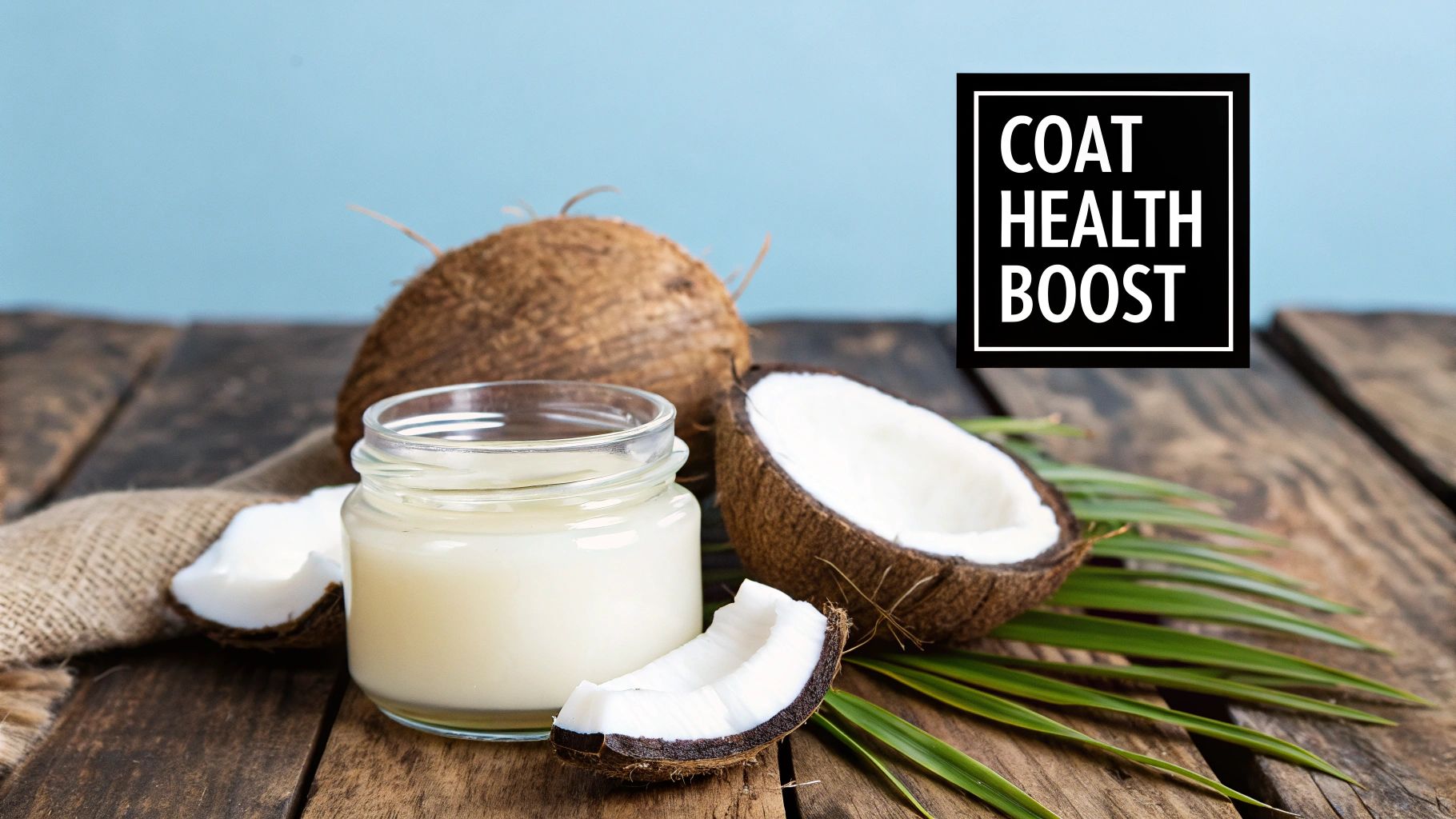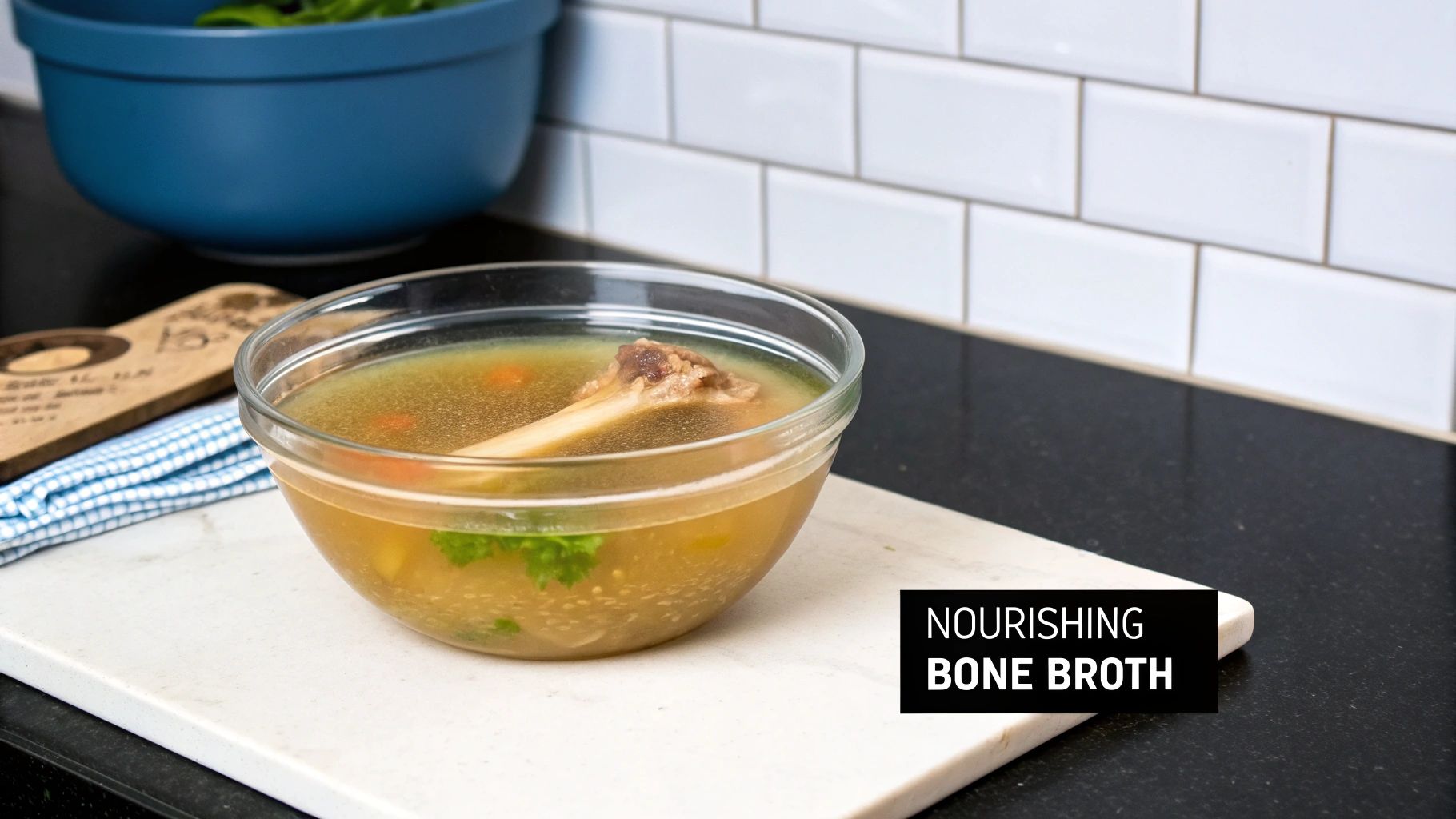
8 Powerful Natural Remedies for Dogs to Try in 2025
As dedicated pet parents, we are always looking for the best ways to support our dogs' health and happiness. While conventional veterinary care is absolutely essential for serious conditions, many owners are exploring holistic options to complement their pet's daily wellness routine. Integrating safe and effective natural remedies for dogs can address common, non-critical issues, from soothing dry skin to aiding digestion and promoting calmness. It's about creating a well-rounded care plan that leverages the power of nature.
This comprehensive guide will explore eight of the most beneficial and widely trusted natural remedies. We will provide a clear roadmap on what makes each remedy effective, specific instructions on how to use it safely, and practical tips for incorporating them into your dog's life. Beyond internal health, maintaining your dog's physical hygiene is also crucial for their well-being; consider utilizing effective pet grooming tools like specialized dog brushes to keep their coat healthy and reduce shedding.
Our goal is to empower you with the knowledge to make informed decisions, helping you naturally enhance your best friend's vitality. Let's dive into the powerful, plant-based solutions you can keep in your wellness cabinet.
1. Coconut Oil
Virgin coconut oil stands out as one of the most versatile and effective natural remedies for dogs, celebrated for its powerful antimicrobial, antifungal, and anti-inflammatory properties. Its benefits stem from a high concentration of medium-chain triglycerides (MCTs), particularly lauric acid, which the body converts into monolaurin. This compound is known to combat viruses, bacteria, and protozoa, making coconut oil a valuable tool for both internal and external health support.

When applied topically, it can soothe irritated skin, disinfect minor wounds, and moisturize dry, cracked paw pads. When given orally, it can aid in digestion, improve coat condition, and even support cognitive function in aging dogs. This dual-purpose utility makes it a staple in many holistic pet care routines.
How to Use Coconut Oil for Your Dog
- For Skin and Coat: Gently massage a small amount of solid or melted coconut oil directly onto areas of dry skin, hot spots, or minor scrapes. For a shiny coat, you can add it to their food.
- For Paw Care: Rub coconut oil into your dog's paw pads before and after walks, especially in harsh weather, to prevent cracking and heal existing sores.
- For Oral Health: Some owners use it as a dog-friendly toothpaste. Its antimicrobial properties can help reduce bacteria in the mouth and freshen breath.
- For Digestive Support: Incorporating it into their diet can help with nutrient absorption and soothe digestive upset.
Getting Started Safely
Expert Tip: To avoid digestive upset or pancreatitis, introduce coconut oil slowly. Start with a very small amount, such as 1/4 teaspoon per 10 pounds of body weight per day, and gradually increase to a maximum of 1 teaspoon per 10 pounds.
Always choose organic, virgin, cold-pressed coconut oil to ensure it's free from harmful chemicals and retains its beneficial nutrients. Monitor your dog for any signs of an allergic reaction or digestive issues like diarrhea when you first introduce it. Consulting with a holistic veterinarian, like those inspired by the work of Dr. Karen Becker, can provide personalized guidance for integrating this remedy into your dog's wellness plan.
2. Apple Cider Vinegar
Raw, unfiltered apple cider vinegar (ACV) containing "the mother" is another powerhouse among natural remedies for dogs, prized for its ability to help balance internal pH levels, support gut health, and combat microbes. The "mother" is a colony of beneficial bacteria, enzymes, and proteins that gives unfiltered ACV its cloudy appearance and much of its therapeutic value. Its natural acidic and antimicrobial properties make it a versatile addition to a holistic wellness toolkit for both internal and external applications.

When used internally, ACV can improve digestion and may help deter urinary tract infections by making the urinary environment less hospitable to harmful bacteria. Topically, its antifungal and antibacterial qualities are effective for soothing itchy skin, repelling fleas, and cleaning ears. This dual-action capability makes it a cost-effective and powerful remedy for various common canine issues.
How to Use Apple Cider Vinegar for Your Dog
- For Skin Health: Create a rinse by mixing one part ACV with one part water. After a bath, pour the solution over your dog's coat (avoiding the eyes) to relieve itchy skin, hot spots, or yeast infections. Do not rinse it off.
- For Ear Cleaning: Dilute ACV with an equal amount of distilled water. Moisten a cotton ball with the solution and gently wipe the inside of your dog's ear flap to clean wax and prevent infections. Never pour liquid directly into the ear canal.
- For Flea and Tick Repellent: The same 50/50 spray can be used as a natural flea and tick repellent before your dog goes outside.
- For Digestive and Urinary Support: Add a small amount to your dog's water bowl to support their digestive system and help maintain a healthy urinary tract.
Getting Started Safely
Expert Tip: Dilution is critical. Never use undiluted apple cider vinegar on your dog, either internally or externally, as its high acidity can cause irritation. Start with a small dose to see how your dog reacts.
Always choose raw, organic, unfiltered apple cider vinegar with the mother to ensure you get all the probiotic benefits. A general guideline for internal use is to add approximately 1 teaspoon for every 50 pounds of body weight to their daily drinking water. When applying topically for the first time, test the diluted solution on a small patch of skin to check for sensitivity. Never apply ACV to open wounds or sores, as it will sting.
3. Turmeric
Turmeric is a vibrant golden spice that has earned its place as one of the most powerful natural remedies for dogs, primarily due to its active compound, curcumin. Celebrated for centuries in Ayurvedic medicine, curcumin offers potent anti-inflammatory, antioxidant, and even anti-cancer properties. It works by inhibiting molecules that play a major role in inflammation, making it an excellent natural alternative for managing chronic pain and joint issues like arthritis.

This incredible spice can provide significant relief for dogs suffering from stiffness and discomfort, improving their mobility and overall quality of life. Beyond joint health, its antioxidant effects help neutralize free radicals, supporting cellular health and protecting the liver. Its multifaceted benefits make turmeric a holistic addition to a dog's wellness regimen, addressing issues from inflammation to immune support.
How to Use Turmeric for Your Dog
- For Joint Pain: The most popular method is creating "golden paste," a blend of turmeric, water, coconut or olive oil, and a pinch of black pepper, which is then added to your dog's food.
- For General Inflammation: Simply sprinkling a small, measured amount of organic turmeric powder over your dog's meal can help combat systemic inflammation.
- In Homemade Treats: Incorporating turmeric into homemade dog treats is an easy way to provide a consistent dose. To explore pre-made options with similar benefits, you can learn more about dog treats for arthritis.
- For Minor Wounds: A paste of turmeric and water can be applied topically to minor cuts and scrapes due to its antimicrobial properties, but it will stain fur yellow.
Getting Started Safely
Expert Tip: Curcumin is not easily absorbed by the body on its own. Always combine turmeric with a healthy fat (like coconut oil) and a pinch of black pepper, which contains piperine, a compound that can increase curcumin absorption by up to 2,000%.
Start with a very small dose appropriate for your dog's size, typically 1/8 to 1/4 teaspoon of golden paste per 10 pounds of body weight per day. Give it with food to avoid potential stomach upset and monitor your dog for any adverse reactions. As with any supplement, consulting your veterinarian is crucial to ensure it's the right choice for your dog's specific health needs.
4. Chamomile
Chamomile is a gentle yet potent herb renowned for its calming, anti-inflammatory, and antispasmodic properties, making it one of the most trusted natural remedies for dogs. This daisy-like flower has been used for centuries in traditional medicine to soothe a variety of ailments. Its effectiveness comes from compounds like apigenin, which has a mild sedative effect, and flavonoids that reduce inflammation and muscle spasms.

This makes chamomile an excellent multi-purpose remedy for addressing everything from anxiety and mild stress to gastrointestinal upset and skin irritations. Whether used as a calming tea or a soothing topical rinse, its gentle nature makes it a safe and accessible option for pet owners seeking a holistic approach to their dog's well-being.
How to Use Chamomile for Your Dog
- For Mild Anxiety: Brew chamomile tea, let it cool completely, and add it to your dog's food or water bowl to help ease stress before car rides or vet visits.
- For Digestive Upset: A small amount of cooled chamomile tea can help soothe an upset stomach, reduce gas, and calm intestinal spasms.
- For Skin Irritations: Use cooled chamomile tea as a final rinse after a bath to relieve itchy skin. You can also apply it as a compress to minor skin irritations or hot spots.
- For Eye Health: A cooled, weak chamomile tea bag can be used as a gentle compress to soothe irritated or goopy eyes, thanks to its anti-inflammatory benefits.
Getting Started Safely
Expert Tip: Always use German chamomile (Matricaria recutita), as it is the most studied and safest type for canine use. Start with a small dose to test for any allergic reactions, especially in dogs with known ragweed allergies.
To prepare a safe dose, brew a weak tea using one tea bag in about 8 ounces of hot water and let it cool completely. A general guideline is to offer 1/4 to 1/2 cup of the cooled tea per 30 pounds of your dog's body weight. When using topically, ensure the liquid is at room temperature. As with any herbal remedy, consulting with your veterinarian is the best way to ensure it's an appropriate choice for your dog's specific health needs.
5. Pumpkin (Pure)
Pure, canned pumpkin (not pie filling) is a powerhouse of digestive support, making it one of the most widely recommended natural remedies for dogs. Its effectiveness lies in a unique blend of soluble and insoluble fiber. This dual-action fiber helps absorb excess water in the gut to firm up stools during bouts of diarrhea, while also adding bulk to relieve constipation, normalizing bowel function from both ends of the spectrum.
Beyond fiber, pumpkin is rich in essential micronutrients like vitamin A, potassium, and iron, offering a low-calorie nutritional boost. It helps promote a healthy gut microbiome and can be a gentle, effective tool for managing minor digestive upsets without resorting to medication. This simple, single-ingredient remedy is a must-have in any dog owner’s pantry for its reliability and ease of use.
How to Use Pumpkin for Your Dog
- For Digestive Upset: Mix a small amount of pure pumpkin directly into your dog’s food to help manage mild diarrhea or constipation. It can also be combined with boiled chicken and rice for a soothing bland diet.
- For Weight Management: Replace a portion of your dog’s regular food with pumpkin. Its high fiber content helps them feel full with fewer calories.
- For Enrichment: Freeze pure pumpkin inside a Kong or other puzzle toy for a healthy, long-lasting treat that provides mental stimulation.
- As a Healthy Topper: Simply add a spoonful to their daily meals to boost their fiber and nutrient intake, which can also help with issues like excessive gas. Find out more about what causes gas in dogs and how diet plays a role.
Getting Started Safely
Expert Tip: Moderation is key. Start with about 1 teaspoon for small dogs or 1 tablespoon for larger dogs per meal. Too much can have a laxative effect.
Always use 100% pure canned pumpkin or fresh, cooked pumpkin puree. Never use pumpkin pie filling, which contains sugar, xylitol, and spices that are harmful to dogs. Ensure the pumpkin is plain and unsweetened. If your dog's digestive issues persist for more than a couple of days or are accompanied by other symptoms like lethargy or vomiting, consult your veterinarian immediately.
6. Bone Broth
Bone broth is a deeply nourishing liquid that stands as one of the most comforting and effective natural remedies for dogs. Made by slow-simmering animal bones and connective tissues, this ancient preparation is packed with essential minerals, collagen, gelatin, and amino acids. Its key components, like glucosamine and chondroitin, are renowned for supporting joint health, making it especially beneficial for senior dogs or those with arthritis.
This nutrient-dense elixir is exceptionally gentle on the digestive system, helping to soothe gut inflammation and support a healthy gut lining. It also serves as an excellent hydration booster and a palatable meal topper for picky eaters or dogs recovering from illness. Its ability to support joints, digestion, and the immune system makes it a holistic powerhouse for canine wellness.
How to Use Bone Broth for Your Dog
- For Joint Support: Serve a small amount daily to senior dogs or breeds prone to joint issues to provide the building blocks for healthy cartilage.
- For Digestive Health: Add a few tablespoons to the food of dogs with sensitive stomachs or during recovery from gastrointestinal upset.
- For Picky Eaters: Pour warm bone broth over your dog's regular kibble to enhance its flavor and entice them to eat.
- For Hydration and Recovery: Offer it to dogs recovering from surgery or illness to provide easily digestible nutrients and encourage fluid intake. It can also be frozen into ice cube trays for a cooling summer treat.
Getting Started Safely
Expert Tip: To maximize nutrient extraction from the bones, simmer them for at least 12-24 hours on low heat. Adding a splash of apple cider vinegar to the water helps draw out valuable minerals.
Always choose a high-quality broth made from grass-fed or pasture-raised animal bones, or make your own to control the ingredients. Ensure it is free from salt, onions, garlic, and other seasonings harmful to dogs. When serving, make sure the broth has cooled and that all cooked bones have been removed, as they can splinter and cause injury. Start by offering a small amount to ensure it agrees with your dog's system.
7. Aloe Vera
Pure aloe vera gel is a powerful topical agent and one of the most respected natural remedies for dogs due to its incredible soothing, anti-inflammatory, and wound-healing properties. The gel from the succulent plant contains over 75 active compounds, including vitamins, enzymes, and amino acids that work together to reduce irritation, fight bacteria, and promote rapid skin cell regeneration. This makes it a go-to for a variety of minor skin ailments.
When applied to a dog's skin, aloe vera creates a protective barrier that moisturizes while providing immediate relief from itching and burning. It is particularly effective for soothing hot spots, healing minor cuts, and calming insect bites. While Aloe Vera is widely known, there are many unique varieties in the Aloe genus. For example, you can learn more about different types of Aloe like Aloe Bellatula to appreciate the diversity of this plant family.
How to Use Aloe Vera for Your Dog
- For Minor Wounds and Scrapes: Apply a thin layer of pure aloe vera gel to clean, minor cuts to help disinfect the area and speed up the healing process.
- For Hot Spots and Itchy Skin: Gently dab the gel onto inflamed hot spots or areas of irritated skin to reduce redness and discourage licking. Discover more ways you can soothe an itchy dog on joyfullpet.com.
- For Sunburn Relief: If your dog has light-colored fur or a sparse coat and gets a mild sunburn, aloe can provide cooling relief to the affected skin.
- For Insect Bites: The gel's natural anti-inflammatory properties make it perfect for soothing the sting and itch from ant, mosquito, or other insect bites.
Getting Started Safely
Expert Tip: Never allow your dog to ingest aloe vera. The latex part of the plant is toxic and can cause severe digestive upset. Only use 100% pure aloe vera gel from the inner leaf, and ensure any store-bought product is free of alcohol and other additives.
To ensure safety, it's best to use gel harvested directly from an aloe vera plant you own. When using a commercial product, select one specifically formulated for pets or that is labeled as 100% pure inner leaf gel. Always apply a small amount to a test area first to check for any adverse reactions and use an Elizabethan collar to prevent your dog from licking the gel off.
8. Calendula
Calendula (Calendula officinalis), often called pot marigold, is a gentle yet potent herbal remedy renowned for its powerful wound-healing, anti-inflammatory, and antimicrobial properties. It is widely regarded as one of the safest and most effective natural remedies for dogs when it comes to topical skin issues. Its benefits come from compounds like flavonoids and triterpenoids, which help reduce inflammation, fight bacteria, and promote new tissue growth, making it an excellent choice for soothing a variety of skin ailments.
Often prepared as a cream, salve, or infused oil, calendula is ideal for treating minor cuts, scrapes, insect bites, and hot spots. Its gentle nature makes it suitable for sensitive skin, helping to calm irritation from conditions like eczema or dermatitis without causing further distress. This remarkable healing ability has cemented its place as a cornerstone of herbal first-aid kits for pets.
How to Use Calendula for Your Dog
- For Minor Wounds and Scrapes: Apply a calendula cream, salve, or diluted tincture directly to clean, minor cuts and abrasions to help prevent infection and speed up healing.
- For Irritated Skin: Use a cooled calendula tea as a gentle rinse for itchy skin, hot spots, or areas affected by dermatitis. Simply steep dried flowers in hot water, let it cool completely, and use it as a final rinse after a bath.
- For Post-Surgical Care: With your vet's approval, a calendula salve can be applied to healing incisions to soothe the skin and minimize scarring.
- For Paw Pad Relief: Massage a calendula-infused oil or balm into dry, cracked paw pads to moisturize and repair the damaged skin.
Getting Started Safely
Expert Tip: Always perform a patch test on a small, unaffected area of your dog's skin before applying calendula more widely to check for any signs of sensitivity or allergic reaction.
When choosing a product, look for organic calendula preparations that are free from alcohol, which can sting and dry out the skin. You can easily make a healing calendula tea at home using dried organic flowers. While calendula is extremely safe for topical use, it's best to prevent your dog from licking it off in large quantities. As with any herbal treatment, consulting a holistic veterinarian can help ensure you're using it correctly and effectively for your dog's specific needs.
Natural Remedies for Dogs: Key Benefits Comparison
| Remedy | Implementation Complexity 🔄 | Resource Requirements 💡 | Expected Outcomes 📊 | Ideal Use Cases 💡 | Key Advantages ⭐ |
|---|---|---|---|---|---|
| Coconut Oil | Low - easy topical/internal use | Requires sourcing virgin organic coconut oil | Improved coat, skin health, immune support | Skin hydration, coat shine, minor cuts | Natural antimicrobial, boosts cognition, safe |
| Apple Cider Vinegar | Moderate - must dilute before use | Raw, unfiltered ACV with mother culture | Balances pH, antimicrobial, digestive support | UTI prevention, flea deterrent, skin rinse | Antimicrobial, pH balancer, flea/tick deterrent |
| Turmeric | Moderate - preparation needed | Turmeric + black pepper + fat for absorption | Anti-inflammatory, joint support, pain relief | Arthritis, inflammation, liver health | Potent anti-inflammatory, antioxidant |
| Chamomile | Low - simple brewing and application | Dried flowers or tea bags, extracts | Calms anxiety, soothes skin and digestion | Anxiety, skin irritations, digestive upset | Gentle sedative, antimicrobial, very safe |
| Pumpkin (Pure) | Low - simple addition to diet | Plain canned or fresh pumpkin | Digestive health, regulates bowel movements | Diarrhea, constipation, weight management | Fiber-rich, tasty, nutrient dense |
| Bone Broth | High - slow cooking required | Animal bones, long simmer time | Joint support, digestive healing, hydration | Senior dogs, recovery, joint issues | Rich in collagen, minerals, aids digestion |
| Aloe Vera | Low - topical only | Pure aloe gel without additives | Wound healing, skin soothing | Minor cuts, burns, hot spots | Natural anti-inflammatory, cooling, moisturizing |
| Calendula | Low to moderate - topical use | Tinctures, creams, dried flowers | Wound healing, anti-inflammatory | Minor wounds, skin irritations | Safe, gentle, antimicrobial, accelerates healing |
Integrating Natural Remedies with Veterinary Care
Navigating the world of natural remedies for dogs can feel both exciting and empowering. As we've explored, ingredients like turmeric, coconut oil, and chamomile offer incredible potential for supporting your dog’s well-being, from soothing itchy skin to aiding digestion and reducing inflammation. We've seen how pure pumpkin can firm up stool, bone broth can hydrate and nourish, and calendula can gently heal minor skin irritations. Each of these remedies, rooted in nature, provides a way for you to take a proactive, hands-on role in your canine companion's health journey.
The true power of these solutions, however, lies not in using them in isolation, but in integrating them wisely and safely into a comprehensive wellness plan. The most crucial takeaway from this guide is that natural does not automatically mean safe for every dog in every situation. Your veterinarian is your most important partner in this process. They understand your dog's unique health history, current medications, and any underlying conditions that could be affected by a new supplement.
Your Actionable Path Forward
Before you rush to the pantry, it's essential to establish a clear and responsible plan. Mastering this balanced approach ensures you provide benefits, not risks. Here are your next steps:
-
Review and Select: Look back through the remedies we've discussed. Identify one or two that seem most relevant to your dog's specific, non-emergency needs. Are they struggling with dry paws? Perhaps coconut oil is a good starting point. Occasional digestive upset? Pure pumpkin might be the answer.
-
Schedule a Vet Consultation: This step is non-negotiable. Book an appointment or call your veterinarian to discuss the specific natural remedies for dogs you're considering. Be prepared with your notes: which remedy, why you want to use it, and what you hope to achieve. Ask them for dosage recommendations tailored to your dog's weight and health status.
-
Start Low and Go Slow: Once you have veterinary approval, introduce any new remedy gradually. Begin with a smaller-than-recommended dose to monitor for any adverse reactions, such as digestive upset or allergic responses. This cautious approach allows your dog's system to acclimate.
-
Document Everything: Keep a simple health journal for your dog. Note the date you started the remedy, the dosage given, and any changes you observe, both positive and negative. This log will be invaluable for tracking progress and for future discussions with your vet.
By embracing this collaborative mindset, you transform from just a pet owner into a well-informed wellness advocate for your dog. You are combining the ancient wisdom of nature with the precision of modern veterinary science. This holistic approach is the gold standard for creating a vibrant, healthy life for your furry family member, ensuring they feel their absolute best from the inside out. Your commitment to responsible, informed care is the greatest gift you can give them, paving the way for many more years of happy, healthy companionship.
Ready to incorporate scientifically-backed natural solutions into your dog's routine without the guesswork? Joyfull crafts premium, vet-formulated supplements using many of the powerful ingredients discussed here, ensuring optimal purity and dosage. Explore our targeted wellness formulas at Joyfull to give your dog the very best of nature and science.

